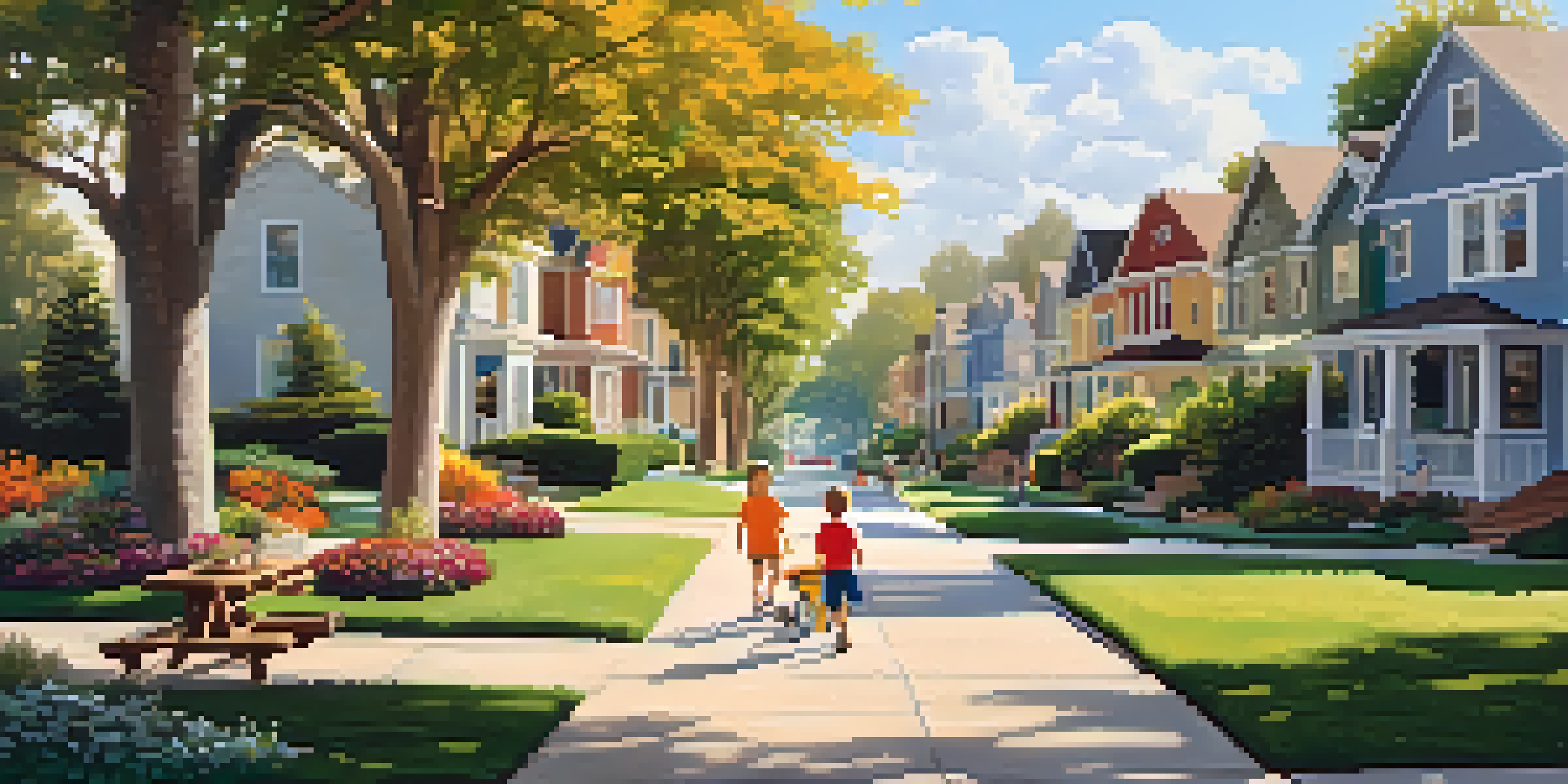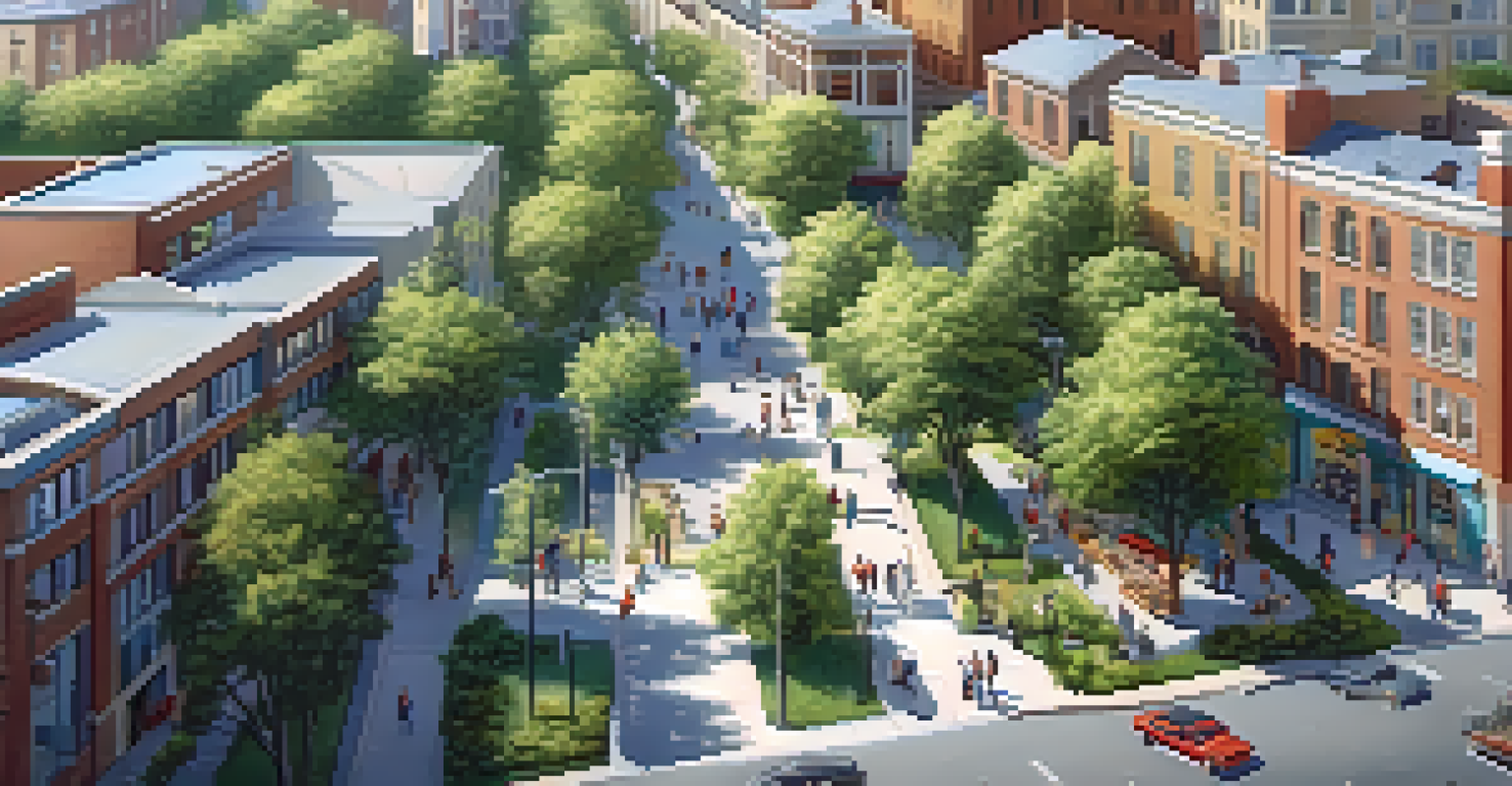How Neighborhood Reputation Affects Property Value Trends

The Importance of Neighborhood Reputation in Real Estate
When it comes to real estate, a neighborhood's reputation can be just as crucial as the property itself. Buyers often consider the safety, amenities, and community vibe when choosing where to live. A good reputation can attract buyers, while a negative one can push them away, affecting property values significantly.
Location, location, location. It's the mantra of real estate, and it's true. The neighborhood can make or break the value of a home.
Imagine you’re looking to buy a home. You might be drawn to a neighborhood known for its friendly community and excellent schools. Conversely, areas with a reputation for high crime rates or poor services can deter even the most interested buyers, leading to lower property values.
Ultimately, a neighborhood's reputation influences buyer perceptions and decisions, making it a key factor in real estate transactions. As such, understanding how these perceptions are formed and maintained is essential for homeowners and investors alike.
Factors Influencing Neighborhood Reputation
Neighborhood reputation is shaped by various factors, including crime rates, school quality, and local amenities. For instance, areas with low crime and highly rated schools typically enjoy a more favorable reputation. Residents often evaluate these aspects before making a purchase, leading to a trend in property values.

Consider the impact of local amenities, such as parks, shops, and restaurants. A neighborhood that offers a vibrant dining scene or beautiful green spaces is likely to attract more buyers, subsequently driving up property values. On the other hand, areas lacking these features may struggle to maintain their appeal.
Neighborhoods Shape Buyer Choices
A neighborhood's reputation significantly influences buyer perceptions, impacting property values and decisions.
Community engagement also plays a vital role in shaping reputation. Neighborhoods with active associations and regular events foster a sense of belonging, making them more attractive to potential buyers. As a result, these neighborhoods often see stable or rising property values.
The Role of Media and Online Reviews
In today's digital age, media coverage and online reviews can dramatically influence neighborhood reputation. A single news report about crime or a viral social media post can shape perceptions almost overnight. This highlights how interconnected our perceptions of neighborhoods are with the information we consume.
A neighborhood is more than just a location; it's the community that shapes our lives and values.
For instance, if a neighborhood is featured positively in local news or lifestyle blogs, it can boost interest and investment in that area. Conversely, negative media coverage can lead to a swift decline in property values as potential buyers look elsewhere.
Online platforms like Yelp and Zillow also play a role in this narrative. Potential homeowners often check reviews and ratings before making decisions, making it essential for neighborhoods to maintain a positive online presence.
Gentrification and Its Impact on Property Values
Gentrification is a complex process that can significantly impact a neighborhood's reputation and, subsequently, its property values. As new, often wealthier residents move in, they may bring improvements and investments, raising the area's profile. This can lead to increased property values, benefiting sellers and investors.
However, gentrification can also create tension within established communities, leading to displacement of long-time residents. This shift can alter the neighborhood's reputation, sometimes negatively impacting property values for homes that become less accessible to the original community.
Local Policies Impact Values
Government initiatives, such as infrastructure improvements, can enhance neighborhood appeal and boost property values.
The balance between revitalization and maintaining the character of a neighborhood is delicate. Understanding this dynamic can help buyers and investors navigate property value trends more effectively.
The Effects of Local Policies on Neighborhood Reputation
Local government policies can significantly shape neighborhood reputation and property values. Initiatives such as improved public transportation, zoning laws, and community development projects can enhance an area's appeal. When residents see that their local government is investing in their community, they are more likely to feel satisfied and proud of their neighborhood.
For example, a city that prioritizes parks and green spaces not only improves the quality of life for its residents but also attracts potential buyers. This, in turn, can lead to higher property values as demand for homes in such neighborhoods increases.
Conversely, policies that are perceived as detrimental, such as increased taxes or lack of investment in infrastructure, can lead to a decline in reputation and property values. Thus, understanding the local policy landscape is crucial for anyone interested in real estate.
Community Involvement and Its Effects on Reputation
Community involvement plays a significant role in shaping a neighborhood's reputation. When residents engage in local events, volunteer efforts, or neighborhood associations, they foster a sense of community and belonging. This active participation can enhance neighborhood appeal and, by extension, property values.
For instance, neighborhoods that host regular community clean-ups or festivals often create a vibrant atmosphere that attracts buyers. A strong sense of community can make homes more desirable, resulting in increased property values as demand grows.
Community Engagement Matters
Active community involvement fosters a sense of belonging, enhancing neighborhood reputation and increasing property values.
Moreover, engaged residents are more likely to advocate for improvements and resources, further enhancing their neighborhood's reputation. This cycle of engagement and enhancement can lead to sustained property value growth.
The Future of Neighborhood Reputation and Property Values
Looking ahead, the relationship between neighborhood reputation and property values is likely to evolve. As remote work becomes more common, buyers may prioritize different factors, such as space and access to nature, over traditional metrics like proximity to downtown areas. This shift could reshape how neighborhoods are perceived and valued.
Additionally, the growing emphasis on sustainability and green living can influence reputation and demand. Neighborhoods that prioritize eco-friendly initiatives may see a rise in interest, leading to increased property values as more buyers seek out sustainable living options.

Staying attuned to these trends is essential for homeowners and investors. By understanding how neighborhood reputation can shift over time, they can make informed decisions that align with the evolving real estate landscape.